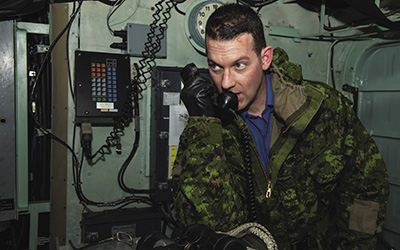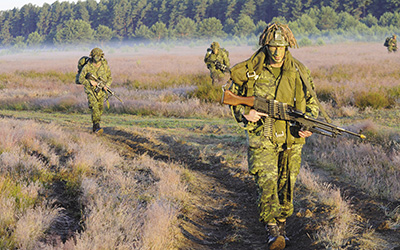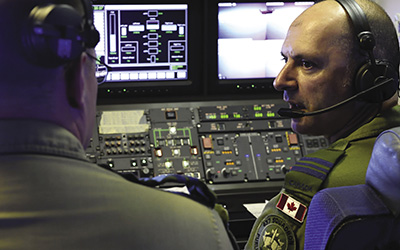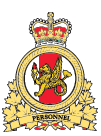VIEWS AND OPINIONS

CFB Kingston Base Photo, Photo 205632
RMC graduation 2009
General Culture as School of Command: Training our Young Officers
by Danic Parenteau
For more information on accessing this file, please visit our help page.
Introduction
One is not born an officer, but becomes one. The path that leads a young man or woman to acquire the skills, knowledge, and ethos of an officer fit to exercise command are, of necessity, rigorous and selective. Not just anyone can become an officer. Training professionals in the management of violence1 is one of the essential missions of the Canadian Armed Forces (CAF), and, in particular, of the Canadian Military Colleges (CMCs).
What type of initial training is the best for producing ‘good’ officers? What type of officers will the CAF need in the coming years? Is the training currently being given in the Canadian Military Colleges the most appropriate for training the officers of the future? This article reflects upon these questions and offers a few suggestions in response.
Should officer training be adapted to the political context?
Recent studies and analyses of and reports on the CMCs all emphasize the need for regular changes, sometimes big ones, to initial training for officers—changes that would reflect the shifting overall geopolitical context in which the CAF operates, and, in particular, the major transformations affecting warfare and military operations. Because the missions in which the CAF participate change over time, initial training for officers should be reviewed periodically so that it can be adapted to those changes.
For example, in response to the growing importance of peacekeeping and peace-building operations in the post–Cold War period, the Report of the RMC Board of Governors – Review of the Undergraduate Program at RMC (“Withers Report”) of 1998 recommended that the core curriculum be reinforced in the training given at the Royal Military College of Canada (RMCC) (Recommendation 13). The report’s authors believed that it was important to ensure that young officers acquired a solid grounding in subjects such as Canadian military history, international affairs, civics, and international law. During the first decade of this century, under the influence of strategic thinking developed primarily in the United States, all Western armies were affected by the Revolution in Military Affairs. Because the new theatres of operations would be dominated by new technologies, it was important to equip officers with solid skills in that area. Officership in the 21st Century: Detailed Analysis and Strategy for Launching Implementation (Officership 2020), published in March 2001, expressed that new concern, particularly in its Key Initiative 2: “Develop the technology component of the Common Body of Knowledge to be imparted to all officers.”2 More recently, in a much- remarked-upon article in the Winter 2011 issue of the Canadian Military Journal, “Brains and Brawn: Cultural Intelligence (CQ) as the ‘Tool of Choice’ in the Contemporary Operating Environment,” Emily Spencer posited the need for better officer training with respect to “cultural intelligence.” Basing her argument upon the Canadian experience in Afghanistan, she held that CAF officers must develop that essential skill: Quite simply, people are a key if not the key component to mission success in the contemporary operating environment (COE), a space characterized by complexity, ambiguity, volatility, change, and danger.3
What are we to take from the various recommendations made in these reports? In a little less than 20 years, we have moved from a vision of initial training for officers that was focused upon international affairs, to another emphasizing new technologies, then, more recently, to a vision based upon cultural intelligence. The reports’ recommendations force us to recognize that it is extremely difficult to predict the environments where the CAF will be called upon to intervene in the future, and, consequently, it is difficult to model initial training for officers based on that environment. Who can know the nature of the primary operations that future CAF officers will have to command in 10, 20 or 30 years? What will be the nature of the real challenges facing the officer cadets we are training today once they are deployed in a theatre of operations as junior and intermediate leaders of operational units?
Modelling initial training for officers based upon contemporary operational experiences or upon the most recent changes in the military environment may not be the best way to prepare our young officers. Rather, we should take a long-term perspective when reflecting upon the best kind of training to give them.

DND photo ET2014-7006-03 by Corporal Michael Bastien
Critical thinking anchored in a broad general culture in the service of the profession of arms
“The real school of command is general culture.”
– Charles de Gaulle
In a context characterized by a high level of uncertainty, in which it is extremely difficult to predict what future CAF missions will look like, it is crucial that our officers develop the skills of versatility and adaptability. They must be able to excel in adapting their actions and making decisions in a range of new and unpredictable situations. How can we teach these skills? What type of training can best help our young officers master them? These skills must be acquired through the development of critical thinking anchored in a broad general culture in the service of the profession of arms.
“Critical thinking” is the ability to exercise good judgment in determining the validity of theories, explanations or arguments by challenging them. Critical thought is independent thought that is not overly influenced by any form of rigid, predefined thinking —for example, by training that is overly specialized or tailored for a single context, and therefore, not easily transferable to other contexts. Critical thinking is based both upon analytical ability and mature judgment.
“General culture” refers to the type of knowledge associated with the great tradition of humanist thought. It aspires to a better overall understanding of human affairs. This type of knowledge is generalist in nature and it focuses more upon the disciplines that are part of the social sciences (sociology, political science, history, anthropology, geography, etc.) and the humanities (literature, communication, rhetoric, philosophy, etc.), but it is also fundamental to the natural sciences (physics, mathematics, chemistry, etc.). General culture does not mean the absence of specialized knowledge. One does not develop general culture simply by refusing to specialize, or by haphazardly accumulating a large amount of knowledge in a wide variety of disciplines. General culture is based upon an overall vision that attempts to bring together a body of knowledge from a number of disciplines in a coherent and significant way. That vision involves the ability to put knowledge in context, to draw connections between it and other knowledge, and to identify the major principles or dynamics driving various phenomena, so that the same principles or dynamics can later be detected in other contexts.

DND photo AS2014-0045-006 by Sergeant Bern LeBlanc
Exercising command in any situation
Officers who possess strong critical thinking skills anchored in a broad general culture will be more versatile and adaptable when faced with new situations. Critical thinking, supported by general culture, will enable them to mobilize their intellectual resources to guide their actions and their decision making in order to exercise command and to successfully accomplish the mission.
On one hand, critical thinking anchored in general culture arises from a mindset that privileges independent learning. Officers who, early in their careers, develop this intellectual capacity characterized by curiosity, the acquisition of a good base of knowledge in a wide variety of fields, the ability to synthesize, analytical skills, and sound judgment will be better able to learn independently. They will be better able to benefit from their personal experiences as well as those of others, using what they learn from their environment to guide their actions and decisions for the good of their organization and their subordinates.
On the other hand, as part of their initial (and specialized) training, officers acquire a large quantity of technical skills and know-how that equip them to handle a wide variety of situations that they may face during their careers. Once they have internalized this know-how, most often by way of ‘drills,’ all military personnel—officers and non-commissioned members alike—should be better able to react quickly when exposed to a routine situation.4 This know-how is acquired essentially through training and instruction.
However, when an officer is placed in a new situation, that is, a situation for which there is no pre-existing solution, the best tool that officer can have is a broad general culture. General culture is the essential faculty that enables the individual to handle unforeseen situations, according to Lieutenant-Colonel David Last in his article “Educating Officers: Post Modern Professionals to Control and Prevent Violence.”5 When he or she is in a new situation, for which, by definition, there is no ‘turnkey solution’ and no know-how that can be mobilized, the officer is left to his or her own devices to imagine the best possible course of action. Therefore, the officer must be capable of setting aside the predefined thinking patterns that were acquired during training and of relying upon his or her own intellectual resources and practicality. The critical thinking and general culture required can be developed only through education.
It could be argued that initial training for officers should focus primarily upon the acquisition of skills or knowledge specific to exercising command at the tactical level, and that the development of general culture should be left until later stages of officer training. After all, senior officers are likely to have more opportunities to build upon this culture, whether at the operational or the strategic level. But the development of critical thinking anchored in general culture is a cumulative process that occurs over the long term: it must begin in early adulthood and be strengthened for the rest of a person’s life. Therefore, the development of that culture and thinking should be an important element in the initial training of officers.
Cultural intelligence
The long engagement of Canadian troops in Afghanistan—the CAF’s longest since the Second World War—revealed serious shortcomings, particularly among officers, with respect to cultural intelligence, “…the ability to recognize and understand the shared beliefs, values, attitudes, and behaviours of a group of people, and to apply that knowledge toward achieving specific goals.”6 A number of studies have demonstrated that such an ability could, by acting as a real ‘force multiplier,’7 contribute to greater operational effectiveness, especially in theatres where success is also measured in terms of support to the civilian population, and even in missions involving aid to the civil power here in Canada.
The development of cultural intelligence should play a central role in initial training for officers. However, it will not be possible to acquire cultural intelligence except as part of general culture, since cultural intelligence is, in a sense, the anthropological or ethnological dimension of general culture. It would be a mistake to consider cultural intelligence as a form of knowledge that is learned like any other, such as a technical skill or a form of know-how. It is actually more of a mindset that makes cultural differences more visible, rather than a skill. It can really only be developed by people who are already intellectually curious and are already able to employ critical thinking anchored in general culture.

DND photo IS2014-1029-05 by Sergeant Matthew McGregor
The officer: Both warrior and cultivated person
“The nation that will insist upon drawing a broad line of demarcation between the fighting man and the thinking man is liable to find its fighting done by fools and its thinking by cowards.”
– Sir William Francis Butler
Anyone interested in the issue of whether critical thinking anchored in a broad general culture is essential for every officer must inevitably consider the specific nature of the environment in which that thinking is to be mobilized: the military environment. Some say that a good officer is defined by his or her proficiency in everything to do with the profession of arms. Officers must live up to their status of professionals in managing violence. As such, they must first demonstrate ‘warrior’ skills, namely, the skills required to lead troops in combat, which is the ultimate requirement of any armed force.
However, an officer does not function only as a warrior. To command and to exercise the sound judgment required for making good decisions, officers must also be able to draw upon considerable intellectual resources. They must have critical thinking skills supported by a broad general culture. In other words, an officer must be a cultivated person. Indeed, an officer cannot be a warrior without being a cultivated person, any more than he or she can be a cultivated person without being a warrior. Every good officer must be both. The two dimensions are inseparable for any good officer; they form a coherent whole that must be embodied in the same person, who is aware of simultaneously personifying both dimensions and using them in his or her command.
Certainly, it is difficult to reconcile the two profiles, since the qualities that make a good warrior and those that lead a person to develop critical thinking skills and to acquire a broad general culture are different in nature. In the general population, few people have the potential to become both battle-ready soldiers and people who possess both critical thinking skills and a broad general culture. In addition, a career as an officer is within reach of very few people.
For these reasons, initial training for officers should be designed to train young men and young women who, from the outset, demonstrate the capacity to simultaneously develop the two desired qualities. It is important that their training not separate the two dimensions, as that would be likely to mould warriors who are lacking in critical thinking skills, uncultivated and unfit to exercise command in new situations, or the opposite; intellectuals who are incapable of commanding troops in a theatre of operations. If we want to encourage our young officers to aspire to that ideal, we must provide them with a well-integrated, coherent training program that emphasizes both these two aspects of the whole.
Conclusion
In order to function in a new and unpredictable environment, officers must be versatile and adaptable. The best intellectual tool an officer can have for developing his or her skills is critical thinking anchored in a broad general culture. Developing critical minds should therefore be an integral part of initial training for officers in the CAF and occupy a prominent place in the training given by the CMCs. This training model is the one that will best serve the CAF, no matter what specific missions are entrusted to it in the future.
Danic Parenteau attended Royal Military College Saint-Jean and graduated from the Royal Military College of Canada (1996). He has been a professor at RMC Saint-Jean since it re-opened in 2008. He has a Ph.D. in philosophy from the University of Paris I (Panthéon-Sorbonne), and has taught at the University of Ottawa, the University of Quebec at Montréal, and CÉGEP Édouard-Montpetit. His main research interests are political ideologies and Quebec politics.
This article was adapted from a section of the Report on the Optimization of Royal Military College Saint-Jean (co-authored with B. Mongeau), submitted to the Canadian Defence Academy in May 2014.

CFB Kingston Base, Photo KN2014-474-13
RMC graduation 2014
Notes
- Samuel P. Huntington, The Soldier and the State: The Theory and Politics of Civil–Military Relations (Cambridge, MA: Belknap (Harvard) Press, 1957), pp. 8–10.
- Officership in the 21st Century: Detailed Analysis and Strategy for Launching Implementation (Officership 2020), 2001, p. I-25.
- Vol. 11, No. 1, p. 15. Other examples are the Report of the Ministerial Committee on the Canadian Military Colleges (“Martin Report,” 1993), the Report of the Officer Development Review Board (“Morton Report,” 1995), the June 2012 report by Major David Wu, “The Value of the Royal Military College of Canada” and the Report of the Officer Development Board (“Rowley Report,” 1969).
- In many ways, it could be said that this is one of the major differences that distinguishes a senior officer’s sphere of responsibilities from that of a non-commissioned officer. A non-commissioned offier's responsibilities are essentially limited to ensuring that his or her subordinates achieve proficiency in those routines; a senior officer’s extend well beyond that. The art of command cannot be reduced to mastering this know-how, essential though it is.
- Lieutenant-Colonel Bernd Horn (ed.), Contemporary Issues in Officership: A Canadian Perspective (Toronto: Canadian Institute of Strategic Studies, 2000), p. 26.
- Emily Spencer and Major Tony Balasevicius, “Crucible of Success: Cultural Intelligence and the Modern Battlespace,” in Canadian Military Journal, Vol. 9, No. 3, 2009, p. 41.
- Emily Spencer, “Brains and Brawn: Cultural Intelligence (CQ) as the ‘Tool of Choice’ in the Contemporary Operating Environment,” in Canadian Military Journal, Vol. 11, No. 1, p. 19.







